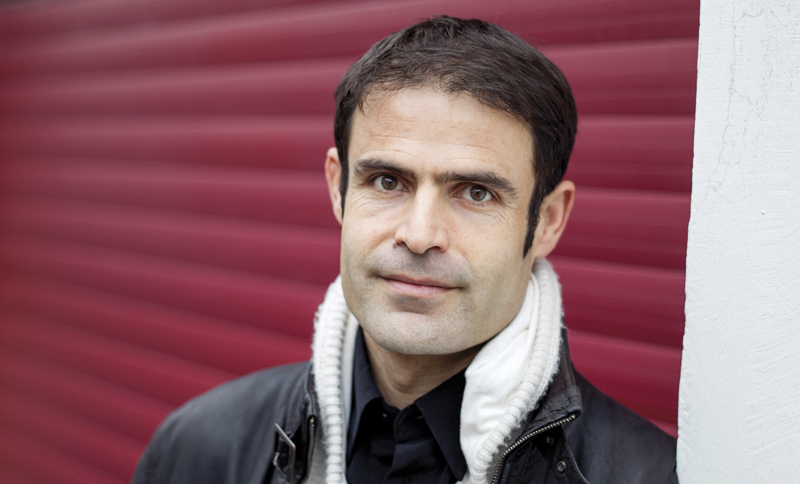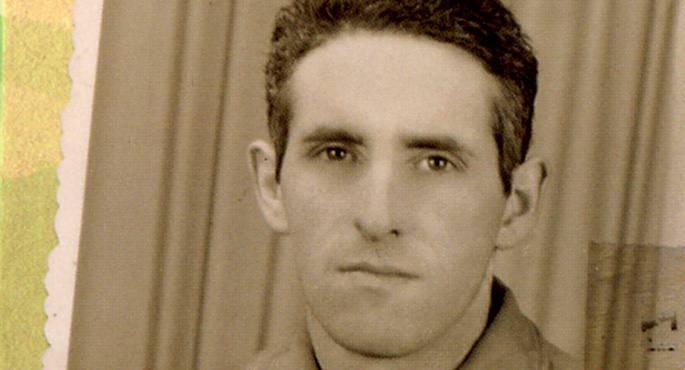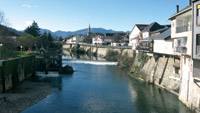"The duration of the theater comes from tackling people's ghosts."
- “I had a black stick caged...”

The fact that a young man from Larzabal in the 1970s is a professional playwright is an amazing thing for some. For you?
Not so much. I have grown up at a time when the Basque amateur theatre was hitting its peak and starting to fall. Thanks to the parents we have seen many plays, it was a common activity in our region. It was, if not in one, the years when all the people were on the table. The passage through Amikuze’s ikastola and the Xalbador center also influences our theater life. Dedicating yourself to the theater and living in the theater was a leap, but it was a natural step. I never felt like I did something that surprised me. It’s true that when people ask “what do you do?” and say “theater,” he adds “and as a profession?”, but I haven’t experienced it too much. What is more, I believe that people have a great need for actors, for peaches or for buffets. Needless to say, in these times we live.
Are fluctuations in the number of spectators linked to the situation of amateur theatre?
Amateur theater is the one that most promotes the life of an audience. It is no coincidence that in some southern counties a young amateur who we have not seen so far approaches the theatre. It's closely linked to amateur work. On the other hand, in Iparralde, amateur theatre has been for years incredibly powerful, but due to the system that Antton Lukuk splendidly dismantles in his Basque Culture, decadence is evident. The spirit of professionalization has guided all forces and professionalization makes the theater become the specialty of a certain people. In those golden years, the theater was a regular social activity, a popular dynamic, an excuse to be with friends and to link... That's what makes public. Leaving social life in the hands of professionals to gain quality is an incredible thymus, as the theatre exit from the daily life of people empties the public. That is what has happened in Iparralde. The latest works we have created in Euskera have not been able to be given in Zuberoa and Baiona. In 1969, Matalaz offered himself in the Baiona theatre; today that is unthinkable, impossible. That is why I welcome the resurrection of some places, which is the essence of our work, but what we lack is fear. Who stops being a normal action ends up disappearing.
The usual thing in the Basque Country is to complain about the institutions.
The future of theatre is not in the hands of institutions. That does not mean that we do not need them, but they have to work for us and not the other way around. However, we have lost our criteria and we are referring to those they have set. Anyway, theater is not only the mirror of society, but it's collective, and when I work as a team, I multiply my own strengths. If we are working in a chosen direction and on a common objective, we are more than ten. We are not against Dabid Goliath, in any case we are a team. That is why I say that ours is Martintxo. In our country we do not have durum wheat, and since we cannot make bread without wheat, we have to go to the town of Basajaun, which has a lot of frightening wheat grain. We know it's impossible, but we'll make you believe that we'll take the celery to jump over the pile, and when we fall in the finish line, we'll keep the grains of wheat in the boots to bring them to our people and be able to make bread. We have to move forward in this petty-minded and quite Euskaldun spirit. The challenge is to multiply. Let each action generate another two, those two, four, those four, eight ... Let each initiative generate many others that are not in our hands. I do not expect institutional recognition. It's good for the navel and the pocket, but ultimately nothing. I just want to do theater in Euskera in Zuberoa and Baiona.
If Martintxo's attitude is not...
Of course, but not an attitude that only affects the actors. It is the option that any worker can offer himself. When a group decides to take a collective venture – we are 20 years old this year – it has to work the balance between the group’s production and the garden itself. I do not believe that there is good collective work that does not absorb everyone’s contribution and absorbs the best of their personality. Within the group's work, feeding the garden itself does good and real work. That's where the theater starts to be political. Because theater is itself political. It's because it's political, because society needs a mirror like the king needs a buffoon if he still lives without being profitable. We can be aware of it or not. I'd rather be conscious and use those weapons.
To make Basque national theatre, for example?
It is true that we are full of Castilian references that we do not share on both sides of the border, but the mere fact of speaking in Basque radically changes the perspective. You can listen to the concert of a Basque speaking in Spanish, the theater in Basque violently creates life in Basque. What is not public is that I cannot get out of the whirlwind of Castilian references, but that I will feel the shortage of Basque references and look for them. At this level, the theater plays its role. Our problem is another: people's lack of code. For example, one of the codes of the theater is that of the tobe, and in that code you can be the key to understanding the play. That is why we have to deal with the shortage of reading code for our culture by the people. We are therefore creating our range of common references.
Besides the tradition of the Tobera, dance and singing are also present in your work.
As we make Basque theatre, we have joined the Tour. If we reject the nozzle, we'd lose some of our personality. The hopper is naturally political, putting your finger on the wound, but if you remove that, what would it look like? Based on aesthetic creations without substance or empty works that have no other purpose but to have a pleasant time for people is not permanent. Duration comes from addressing the ghosts of people and society. Hence the negligible nature of the playwright. We are not specialists in anything, but we drink from all the waters. Back to the Tour, the dantzaris consolidate the plaza, the bertsolaris and the singers take the juice out into the flesh and the surrounding ones remove the landscape. The mixture of all brings good puchero. When you remove the vegetables, you lose flavor. In fact, the word “music” encompassed all the arts. Music was the muse, everything related to inspiration and creativity. In addition, the theater has from its beginnings the vocation of gathering all the trades. It's the mirror of society because it's the meeting point of different professions to create something without profit. Otherwise, I couldn't.
So far, few works have been represented on both sides of the border. Why?
Firstly, it is linked to the political situation. In addition to imposing the physical border, they have managed to take root in people’s thinking. Those of Iparralde have thought that going south would not understand it, and vice versa. For us, when we talk about Euskera, one of the first goals is to work throughout the Basque Country. Once again, we have realized that sometimes we have to move from action rather than from the head. The prioritization of action generates the possibility of going further than is thought. We work in Luhuso and within the structure of Hameka we try to promote these exchanges. But Euskal Herria is more diverse and complex than the North Hegoalde binomial, and in some cases it is easier to go from Urruña to Donostia than to Zuberoa. However, by making proposals and reworking or inviting some plays in the South, we have realized that a public is created aware of the interest in seeing a play in Biscayan. Action breaks people's borders.
To break these limits, some companies offer the same work in both languages. You give some works in French and others in Basque, never in bilingual. Why?
Because the Basque theatre is from the beginning to the end what is thought, created and worked in Euskera. A language is not limited to its own words, it is the expression of the whole life of a society. So if we were to confine ourselves to a simple translation, it would be more superficial, more vain. In our case, it is a conscious and political choice. When we speak in Basque, many French people ask us why we do not make translations in French, even through the panels. If we did, we would not create the need to learn or live in Basque. That does not mean that the Basque theatre cannot be exported outside its political borders. I have given an Empty Chair in Bordeaux, in Catalonia... Moreover, I returned the empty chair I had left in Bordeaux. But I was in France, it wasn't contradictory to my eternal freak, it wasn't a commercial logic.
Are you the same actor in Basque and French?
It may be, but I do it with the different cells or lungs of my being. Speaking in French or in Basque is not just a change of language. Just as the structure of a phrase is different, the words asking for strength are also different. Whether we want it or not, we go through different paths depending on language. There is one conscious part that can be cultivated, but another is the hidden part of the personality that takes its roots into the interior even if it is not chosen by the mind. Antton Luku has always been told that theater is not literature, that theater is a word, and it's hard to explain what gives a voice singularity. Same thing in the same language. What makes that difference in identity between a Biscayan and a Bajonavarro?
What makes you prepared to act in the most pompous and small theatre on the French national scene?
Let us not be fooled, we are invited to speak in French to the theatres of the national scene, they do not want us in Basque. So our choice is to offer theater everywhere, everywhere and for everyone. We are not talking about a certain category. This is a way of working, a capacity that we have worked for twenty years: autonomy. It's like in cultivation, you can choose the model of monoculture and focus on maize production, but when problems arise all your production is going to be broken. We have made an opportunity to diversify our production and we strive to live mostly from our theatre sales. This requires having a truck, transporting stands and lights, and working an autonomous system that gives you the way to act in a mud bath or in the most comfortable theater. That is why I say that our profession requires many trades. I, for example, drove the truck, take it to repair ... That's part of my work. Specifically, when we have a function, we drive it one day, we ride it one day, we perform it at night, we perform it at the end of the play, we detach it and we guide it back to the next day in the morning. You have two or three days of technical work to represent two hours. That's why I also like my job, I like to drive the truck for ten hours, stain my hands during assembly... That's why I don't get crazy.
Do you see the table in 30 years?
Do I have any other opportunities? In our trade, you constantly wonder why you have become involved in the new creation that produces self-appetite and distress, but you always enter. It's hard to leave, it's addictive. We've just lost a teammate, and before that you only have the chance to ruin everything or make it even better. When I say more, I don't mean artistic quality, but I mean taking better care of our minds and the lives of those around us. So, yes, 30 years from now, I see myself on the stage. I don't think we're special about playwrights. Our work only allows us to think about it. That's why they come to pose, and that's why I'm telling you, because I've given myself that privilege.
Manex Fuchs. 1975ean sortu zen larzabaldar honek Bordelen antzerkia ikastera joan eta, 1994an, Le Petit Theatre de Pain konpainia sortu zuen Ximun anaiarekin batera. Geroztik Frantziako eta Euskal Herriko oholtzetan dabil Hamlet, Aulki Hutsa, Errautsak, Traces edo Le Siphon bezalako lan arrakastatsuekin. Publikoari Gorroto eta Iduzkilore lanak ere zuzendu ditu.
“Burutik pasa baino lehen ekintzatik pasatzen dena da aktore ona. Jendeari mementoan asmatu dugun testua esaten ari garela sinetsarazi behar diogu. Hastapenetik jendeak onartzen duen gezur bat da antzerkia, eta guk ere gezur hori sinetsi behar dugu, memento oro dena deskubritzen ari bagina bezala antzeztu”.
You can see "Matalaz/Lertxundi" when you look at the authors of the famous song Matalaz. However, in the middle of the century, Jean-Louis Davant publicly confesses that Matalaz's last words are invented by him, and that he did so "at the beginning of the void" for not having said it... [+]
Esan Pitrau eta txapela erantziko dizu askok Zuberoan bezala Nafarroa Beherean edo Lapurdiko mendialdean. Johañe Pitrau Erbin, XX. mendeko euskaldun inportanteenetako bat dela esatea ez da esajerazioa: hiru mende lehenago Bernard Goihenetxe Matalaz deituak Zuberoako... [+]
Oier Araolazaren aholkuari jarraituz, sare sozialean sortu zen gai bati buruz idaztea erabaki dut. Gai mamitsua, baina gogoratu, hau ez da gauzak nola diren edo nola ez diren azaltzeko topagunea, honek gogoetak trukatzeko tokia nahi du izan.
Eta pastorala hankaz gora jarri zuen kristaua.
Askatasuna behar duela sortzaileak…
Gaixotasun mental pixka bat ere bai, ego elegante bat eta, prefosta, sosa, bena hori hanitxetan ahazten zaie emaitea...














